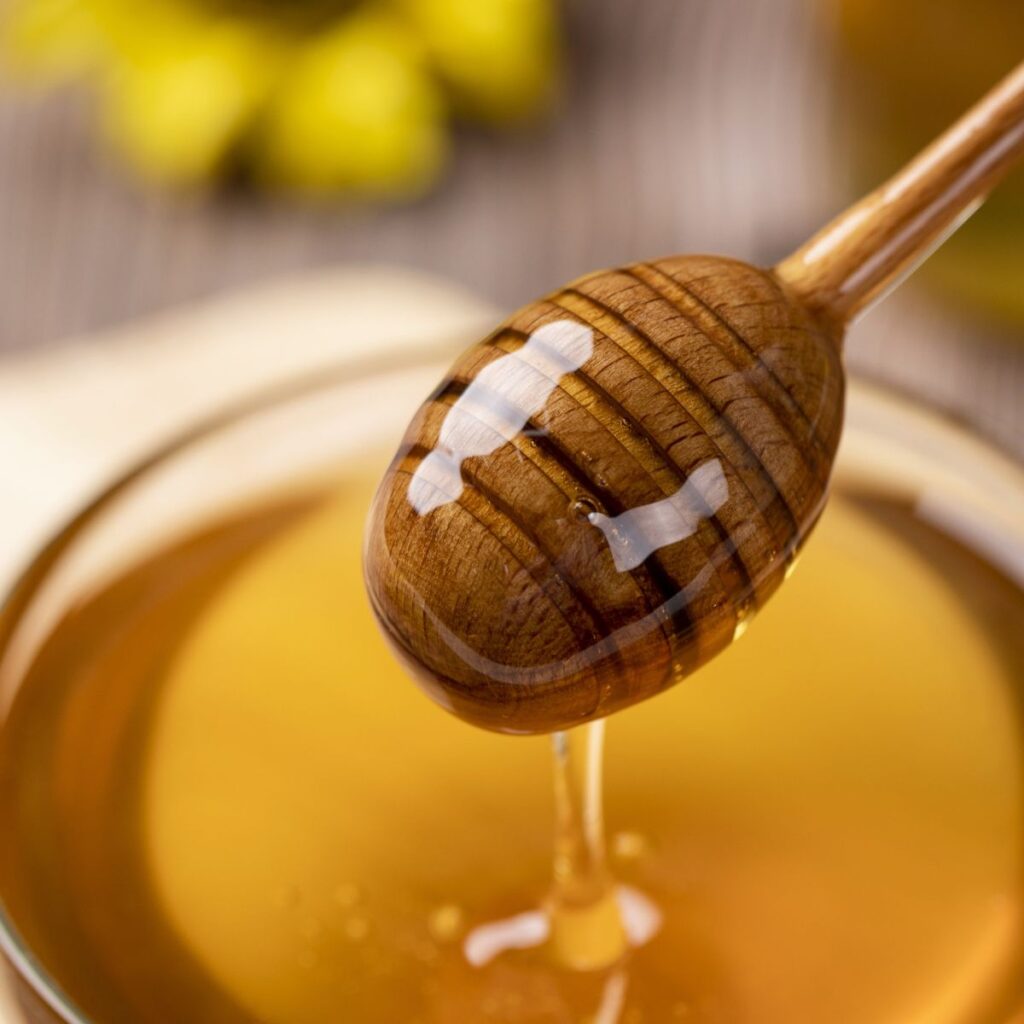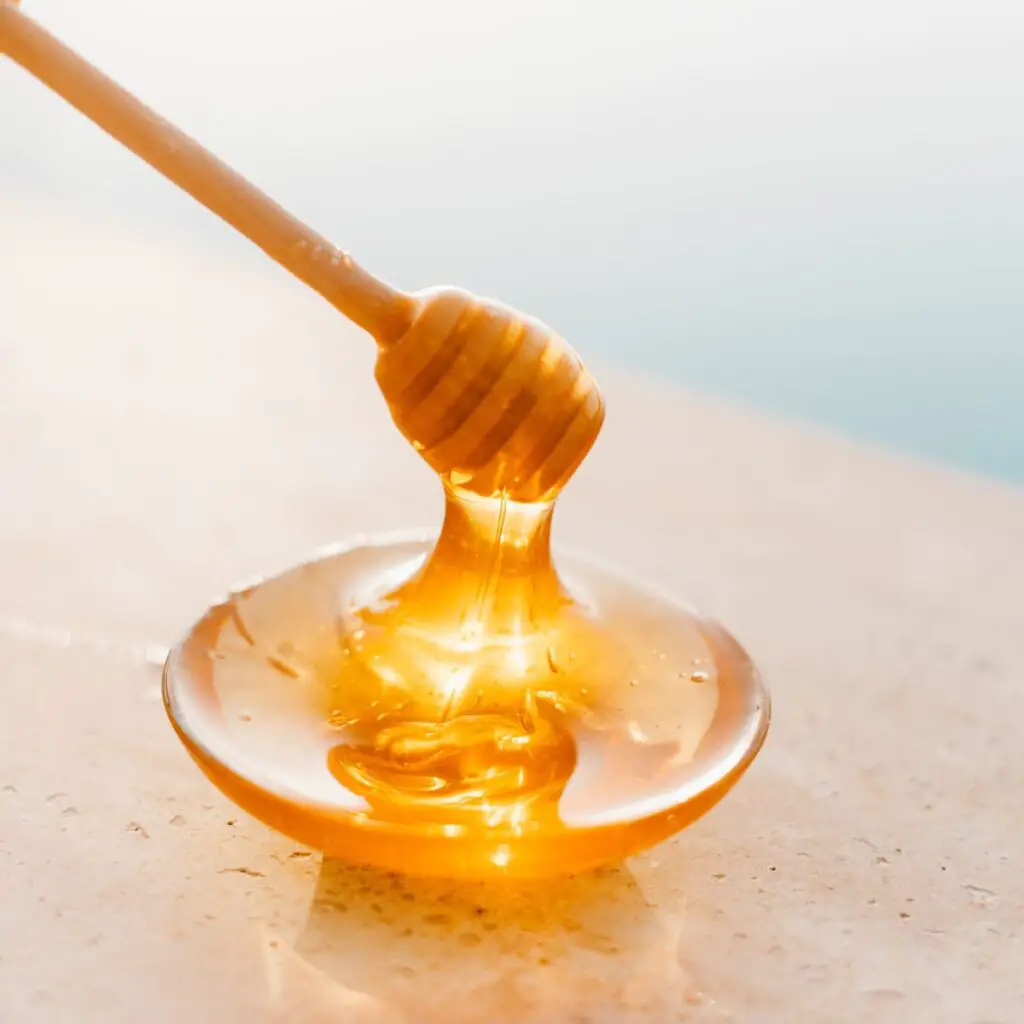Honey is an excellent sugar alternative, and many people use it for different reasons. But is honey completely safe? Is honey flammable? And what happens when you heat honey?
Honey is a kitchen staple that is used for a lot of things. You may even have a honey jar tucked in your pantry or fridge.
We often use honey as a natural sweetener, which is also prized for its health benefits, but have you ever wondered, does honey catch fire? Not that you intend to set a honey jar into flames. But out of curiosity, you probably also wanted to know if honey burns.
Well, here’s the short answer: honey is not flammable. Honey does not necessarily catch fire when heated. Instead, high temperatures will decompose the structure of honey, affecting its taste and texture.
But the quirky thing about honey is that it quickly catches fire. At least, this is the case for pure honey.
If you want to know more about how honey reacts to fire and high temperature, read on.
This post contains affiliate links. I may earn a small commission at NO extra cost to you for purchases made through these links. Disclosure.
What is Honey?
Bees produce raw honey. Honey bees collect nectar from flowers and deliver and store that nectar inside beehives. How bees make honey can be fascinating.
First, nectar is sweet liquid bees suck out from flowers. Bees store nectar in a special compartment within their stomach, where nectar comes into contact with enzymes. These enzymes change the composition of nectar, making it appropriate for long-term storage.
So the collected nectar is placed inside the honeycomb. But because there’s extra water mixed within this raw honey, bees fan wings to remove excess moisture, leaving thick honey. Once that’s done, bees would seal the exteriors of the honeycomb with a special secretion. Raw honey is safe and sound inside the honeycomb, giving bees access to food during the cold winter season.
What is Honey Used For?

Now you know the industrious bees make honey, and you’ll probably have more appreciation for the honey jar you have at home. But let’s remember: pure honey actually has a lot of uses.
Natural Sweetener
The first apparent use of honey is as a natural sweetener. You can use honey instead of table sugar to sweeten your coffee and tea. Pure honey has lower glycemic index than table sugar, so it is less likely to spike your insulin. Also, since honey is composed of fructose, which is sweeter than glucose, then you’ll use less honey to sweeten your coffee.
Nutritional Benefits
Honey has fantastic health benefits. It is rich in antioxidants which help in preventing cardiovascular diseases. Honey is also used to treat coughs and gastrointestinal diseases. Honey is also topically used to heal wounds.
honeyIs Honey Flammable?
Now we get to the most important part: is honey flammable?
No, honey is, technically, inflammable. If we follow OSHA’s standards for flammable substances, it states that any liquid with a flash point of below 93 C or 199.4 F is considered flammable.
However, honey does not ignite at this temperature, so it is not flammable.
Related Posts:
- Is Urine Flammable? Can Urine Start a Fire?
- Is Vegetable Oil Flammable? Does It Catch Fire?
- Understanding the Different Classes of Fire and How to Extinguish Them
- How Hot is Fire? Temperature that Catches Fire
Is Honey Combustible?
We have established that honey is not flammable because it does not catch fire at 93 degrees Celsius and below.
But honey does catch fire at a temperature above 200 degrees Fahrenheit, making it readily combustible.
Does Honey Catch Fire?
Honey, does, in fact, catch fire. Many people use the flame test to verify the purity of honey. By lighting the honey with a match stick, you can tell if you have pure honey or fake honey.
So how does this work?
You take a match stick and dip it into honey. If it burns, you have pure honey. If not, it’s fake honey.
What Happens When You Heat Honey?

If you have crystallized honey, heating honey could help soften it up.
However, heating honey should be done most carefully. Heating honey rapidly over a fire at a very high temperature may destroy beneficial enzymes and weaken its structures. Additionally, heating honey higher than 140 degrees and putting it under prolonged exposure to extreme heat cause rapid degradation.
What is The Boiling Point of Honey?
The boiling point of pure honey is 185 Fahrenheit or 85 Celcius.
But again, we don’t suggest boiling pure honey directly in hot water as it may destroy enzymes that lend honey its health benefits. Also, directly boiling crystallized honey could impact the structure, even the taste, which could end up not to your liking.
What Happens When You Burn Honey?
There is much debate about cooking honey. It’s a bit trickier because, according to Ayurveda, or ancient Indian medicine, burning or overheating honey to very high temperatures can make it poisonous. As a result, honey disintegrates, and its essential nutrients diminish.
Practitioners and followers of Ayurveda believe that it’s best to consume raw honey. Also, cooking and baking with honey is not recommended.
Is Honey Toxic When Burned?
Honey is not toxic when heated or burned. At most, honey’s composition will change under extreme temperatures, and it may not taste good after.
However, some people believe that cooking or heating honey results in losing nutrients, so they refrain from doing so. Instead, they stick to using raw honey instead.
If you are on the fence about this, it is better to use honey as a natural sweetener in your tea or coffee. Store honey in a cool, dry place and away from direct sunlight. This should allow the honey to maintain its composition.
honeyDoes Honey Burn in the Oven?
If you put honey in the oven for an extended period, honey will burn. Honey will turn black and it gives off an acrid smell. At this point, honey is not safe for cooking and baking.
However, you can slowly melt honey by watching the time and temperature. The exact temperature depends on the type of honey, though.
If you’re dealing with crystallized honey, putting it in the oven is a bad way of loosening it up. Instead, put the honey jar inside a bowl, then pour hot water around the jar. This should help slowly melt the honey without damaging its beneficial enzymes.
Conclusion
There you have it — honey is not flammable, because it does not ignite within the temperatures set by OSHA for flammable liquids. However, honey is combustible and catches fire quickly when exposed to high enough temperatures.
Honey is medically proven to be beneficial for our health, and it also makes an excellent sugar alternative. Just make sure not to melt honey in the oven and follow the safest ways to decrystallize honey. That way, you can maximize the benefits that honey has to offer.

Leave a Reply